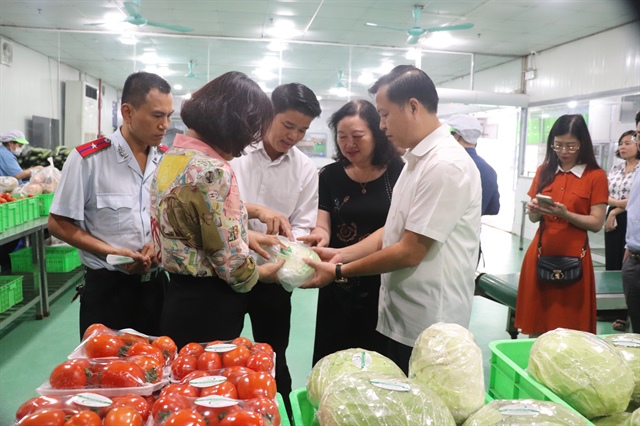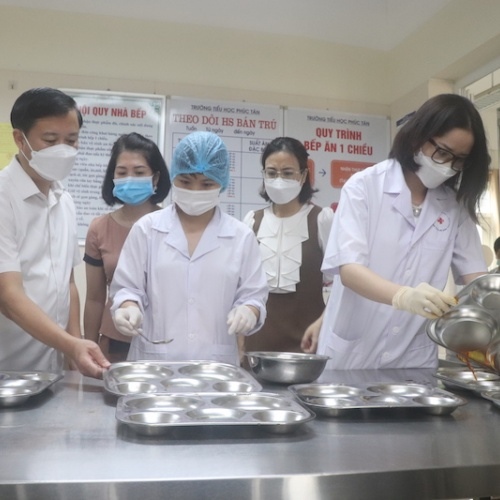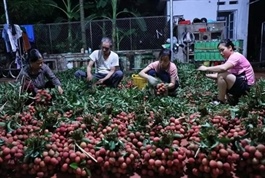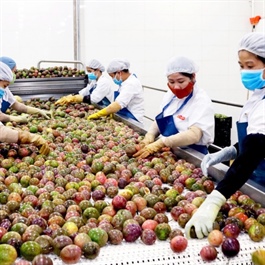Food safety in Hanoi makes great strides
Food safety in Hanoi makes great strides
Hanoi's health sector has stepped up inspections and controls at food facilities and improved awareness and law enforcement, according to the Hanoi Health Department.
Over the past period, the capital's health sector has stepped up monitoring and inspections with targeted and short-notice visits to food production and business establishments, food service providers, street vendors, and canteens. This has gradually raised awareness among producers, traders, and consumers while addressing violations, according to the Hanoi Department of Health.

The city's interdisciplinary food safety inspection team at Davidcorp Vietnam JSC in Thanh Tri District. Photos: Tran Thao |
Currently, Hanoi has more than 77,000 enterprises involved in food production, processing, trading, and street food vending. These include more than 10,000 food producers, nearly 25,500 food traders, over 35,000 food service providers, and about 5,800 street food vendors.
In recent times, the city has implemented a comprehensive program to ensure food safety, focusing on peak periods such as the Lunar New Year and Food Safety Month.
Coordinated actions to guarantee food safety
According to the Hanoi Food Safety and Hygiene Department, ensuring food safety has involved close cooperation between the various agencies and institutions responsible for food safety management.
The city has worked with neighboring provinces to control the sources of food ingredients supplied to Hanoi and to enable food traceability.
During Food Safety Action Month 2024, Hanoi sent 701 inspection teams to more than 12,500 establishments, of which over 10,500 (84.1%) met the requirements, while 1,814 were found in violation. According to the Hanoi Department of Health, the city's relevant authorities have fined 1,679 offending establishments more than VND8.8 billion (US$345,986).
Throughout Food Safety Action Month, the city has emphasized the roles of local governments, management agencies, social organizations, and consumers, raising awareness among producers and traders on food safety compliance and promptly addressing any food safety incidents.
To prevent food poisoning, Hanoi has set up a model to control food safety in all kitchens of 214 primary schools in five districts and five wards in Hanoi. As a result, food safety management in canteen kitchens across the city has been under close scrutiny, according to the Hanoi Food Safety and Hygiene Department.
"Specialized agencies and local authorities continue to conduct short-notice inspections and trace the sources of meat, fish, vegetables and fruits supplied to these kitchens," emphasized Dang Thanh Phong, Director of the Hanoi Food Safety and Hygiene Department.
"Competent authorities will intensify inspections of school kitchens and industrial canteens, focusing on verifying the origin of food ingredients and ensuring strict compliance with food safety regulations by food suppliers."

|
|
The city's interdisciplinary food safety inspection team in the kitchen of Phuc Tan Primary School in Hoan Kiem District. |
Relevant authorities will continue to intensify inspections of school kitchens and industrial canteens, with a focus on verifying the origin of food ingredients used for cooking and ensuring strict compliance with food safety regulations by food suppliers, according to the Director of the Hanoi Food Safety and Hygiene Department.
The city's health department has worked effectively with local authorities to enforce food safety criteria in 196 districts and towns and to maintain 20 food safety streets, he said.
The health sector has also expanded the food safety model at large gatherings to proactively prevent food poisoning, covering 440 communes, wards and towns in 20 districts and towns.
The department noted that after more than six years of implementing the food safety model, Hanoi has established and maintained 60 civilized food safety streets in 30 districts and cities, involving thousands of participating businesses.



























